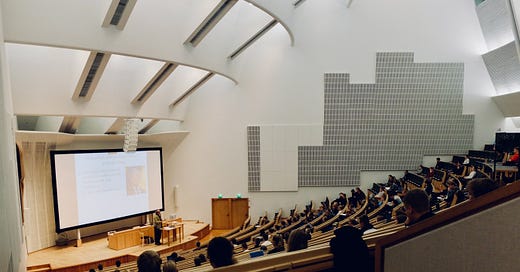“It’s bad, Laura. It’s not good at all.” Not exactly what we wanted to hear from the contractor who found massive rot under our bathroom floors.
Having completely blown the bathroom budget this week, I opened up a LinkedIn email advertising for an adjunct professor position at the community college down the road. After doing a little sleuthing, I figure out that this job was not going to be a great way supplement my freelance work. The pay was lower than what I earned as an adjunct in New York City twenty years ago.
Most people only have the vaguest notion of who is teaching their college kids. With some movie version of a professor in their head, they assume that a senior scholar is in the front of the lecture hall, and that he is well compensated for years of experience, education, and talent. They might think that the $80K college price tag translates to big bucks for faculty. Sadly, that’s not the case. It’s much more likely that your kid’s English professor is living in poverty.
In very general terms, there are two kinds of professors. There are tenure-line professors, who have job security, health insurance, a respectable salary, paid sick leave, contributions to a 401K plan, an office space, and some support for research. Those professors comprise 24 percent of all academic faculty in this country.
About three-quarters of the rest of college faculty are not on the tenure line. Many in this group are called adjunct professors. Like a substitute high school teacher, they are brought in to teach classes on a temporary basis. They are paid per class, have no job security, and no benefits. They have the same instructional responsibilities as tenured faculty, including assembling syllabi, ordering textbooks, writing lectures, and grading exams.
Unlike your local high school, the majority of professors are not permanent, but are these temporary faculty. They teach most of the lower level undergraduate liberal arts classes at your flagship state college. Almost all of my son’s classes in his first two years of college were taught by adjuncts.
In two high-profile articles that I wrote for the Atlantic back in 2015, I reported that the median salary for adjuncts in this country was around $20,000 per year. Eight years later, there doesn’t seem to be much improvement in salaries.
It took a little digging to get an exact number on the adjunct salary at the local community, but I eventually found the union contract in their Human Resources page. This school pays adjunct professors $2,607 for a one semester 3-credit class. If someone taught five classes each semester — a killer classload, btw — that professor would earn a yearly salary of $26,070.
Even that $26,070 salary would be hard to actually achieve, because it’s rare that an adjunct can pick up that many classes at one college. Adjuncts often have to drive around the region teaching at multiple universities to pick up five classes for the semester.
Why does it matter? Nobody forces anyone to become an adjunct professor. There are plenty of other jobs out there. By this point, graduate students certainly have a very informed perspective on the terrible job market.
These low salaries matter, because poorly paid teachers are not good teachers.
I once did an article on food pantries on college campuses, and the staff who ran these pantries told me that professors were using them, too. So, these professors are hungry, like actually hungry. Try teach students about Plato on an empty stomach. Think you would be very effective?
All the other indignities of the job also lead to poor services to students. If adjuncts don’t have an office space to meet students, they might have to arrange their office hours in the staff parking lot. If the college doesn’t have openings the following semester, those professors may never work there again and their college email address is immediately suspended. So, students can’t contact them to ask for a recommendation to law school or a study abroad program.
Being a great college professor is more than just walking into a room and rambling for sixty minutes. A good lecture is a mixture of stage performance, years of accumulated education, and judicious use of the Socratic method. Crafting a lecture takes time, which is uncompensated for the adjunct. The adjuncts aren’t even paid enough to answer emails or grade written assignments.
Online textbooks have made things a bit easier for these adjunct professors, because they don’t have to write exams or grade papers anymore. The textbook companies are now doing that. Soon these publishers will be providing the YouTube lectures, so community colleges won’t even bother hiring professors. Pearson and McGraw Hill are quietly taking over college education all together, but that’s a topic for another day.
So, college students are getting a suboptimal college education. Does that matter?
Well, I think it should matter to parents who are paying a hefty price tag for college, but maybe most parents don’t really care. Maybe parents just want their children to get the credential without dying from alcohol poisoning at a frat party. Maybe they just aren’t curious enough to wonder where all their tuition money is going.
Yet, at some point, someone will shout “the emperor has no clothes!” If people believe that college is no longer making students smarter, the degree will become an empty piece of paper. A very expensive piece of paper.
Some say that students shouldn’t get a liberal arts education and instead go into a trade. The trades are immune to the AI revolution. The guy, who is currently grouting tile in my upstairs bathroom, is certainly earning more than the adjunct professors.
Yet, the demise of college makes me sad. I loved my history and English classes at SUNY Binghamton in the 80s. I loved reading books, so much that I squandered the next decade of my life in graduate school. Later, I stayed up until 2:00am crafting great lectures, because I believed that knowledge matters. I believed that everybody deserved access to a great lecture, even those at state colleges. And I still do.
LINKS

Jessica Grose talks about the Millennial midlife crisis, which doesn’t seem too different from the Gen X midlife crisis.
What is a capsule wardrobe?
Bethany Mandel’s difficulty in defining the word “woke” went viral this week.
Education news: Florida is considering a part-time public school enrollment plan. Lunchables are going to be rolled out directly to students. One school in Ohio has switched to a four-day school week. What happens to college towns, when enrollment drops? Highly recommend Jeff Selingo’s Next newsletter for college gossip.
Reading: This NYT article made me want to check out Ann Napolitano’s new book.
Watching: Last of Us Finale (so good!), The Oscars, Mandalorian, Fleishman is in Trouble
Royal Family Fun Read-of-the-Day: Meghan Markle is the new Fergie




